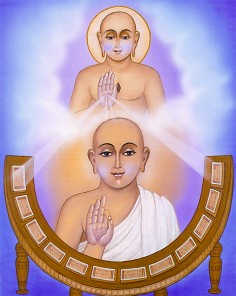Thirty-Third Lecture: The Nature of Karman
I shall now in due order explain the eight kinds of Karman, bound by which the soul turns round and round in the Circle of Births. (1)
The eight kinds of Karman are briefly the following:
- Jñānāvaraṇīya (which acts as an obstruction to right knowledge);
- Darśanāvaraṇīya (which acts as an obstruction to right faith);
- Vēdanīya (which leads to experiencing pain or pleasure);
- Mōhanīya (which leads to delusion);
- Āyuḥkarman (which determines the length of life);
- Nāman (which determines the name or individuality of the embodied soul);
- Gōtra (which determines his Gōtra);
- Antarāya (which prevents ones entrance on the path that leads to eternal bliss).[1] (2, 3)
- Obstruction of knowledge is fivefold (viz. obstruction to):
- Śruta, knowledge derived from the sacred books;
- Ābhinibōdhika, perception;
- Avadhijñāna, supernatural knowledge;
- Manaḥparyāya, knowledge of the thoughts of other people;
- Kēvala, the highest, unlimited knowledge. (4)
- The nine kinds of obstruction to right faith are:
- sleep;
- activity;
- very deep sleep;
- a high degree of activity;[2]
- a state of deep-rooted greed;
- refer to faith in the objects of the first three and the last kinds of knowledge. (5, 6)
- refer to faith in the objects of the first three and the last kinds of knowledge. (5, 6)
- refer to faith in the objects of the first three and the last kinds of knowledge. (5, 6)
- refer to faith in the objects of the first three and the last kinds of knowledge. (5, 6)
- Vēdanīya is twofold, pleasure and pain; there are many subdivisions of pleasure and so there are of pain also. (7)
- Mōhanīya is twofold as referring to faith and to conduct; the first is threefold, the second twofold. (8)
- right faith;
- wrong faith;
- faith partly right and partly wrong. (9)
- what is experienced in the form of the four cardinal passions;
- what is experienced in the form of feelings different from them. (10)
-
Āyuṣka is fourfold as referring to
- denizens of hell;
- brute creation;
- men;
- gods. (12)
- Nāman is twofold, good and bad; there are many subdivisions of the good variety, and so there are of the bad one also.[4] (13)
- Gōtra is twofold, high and low; the first is eightfold, and so is the second also. (14)
Antarāya is fivefold as preventing:
- gifts;
- profit;
- momentary enjoyment;
- continuous enjoyment;[5]
- power. (15)
The three kinds of Mōhanīya referring to faith are:
The two kinds of Mōhanīya referring to conduct are:
The first kind of this Karman is sixteen fold, the second sevenfold or nine fold.[3] (11)
Thus the division of Karman and the subdivisions have been told.
Now hear their number of atoms,[6] place, time, and development. (16)
The number of atoms of every Karman is infinite; it is (infinitely) greater than (the number) of fettered[7] souls, but less than that of the perfected ones. (17)
The Karman in the six directions of space[8] binds all souls, and it binds the whole soul in all its parts in every possible way. (18)
The longest duration (of Karman) is thirty Krores of Krores of Sāgarōpamās,[9] and the ṣortest a part of a muhūrta. (19)
This holds good with both āvaraṇīyas, with Vēdanīya and Antarāya. (20)
The longest duration of Mōhanīya is seventy Krores of Krores of Sāgarōpamās, and the shortest a part of a muhūrta. (21)
The longest duration of āyuṣka is thirty-three Krores of Krores of Sāgarōpamās, and the shortest a part of a muhūrta. (22)
The longest duration of Nāman and Gōtra is twenty Krores of Krores of Sāgarōpamās, and the shortest eight muhūrtas. (23)
The number of perfected souls is infinite, and that of the subdivisions of Karman[10] is also (infinite); the number of atoms in all these (subdivisions) exceeds (the number) of all souls. (24)
Therefore a wise man should know the different subdivisions of these Karmans, and should exert himself to prevent and to destroy them. (25)
Thus I say.
Nos. 1-4 are nidrā, prachalā, nidrānidrā, prachalāprachalā; I render the etymological meaning of these words. According to the Dīpikā, however, they have a different meaning: nidrā means the state of agreeable waking; prachalā, the slumber of a standing or sitting person; nidrānidrā, deep sleep; prachalāprachalā, sleep of a person in motion. Nos. 6 and 7 are here called chakkhu and achakkhu, instead of ābhinibōdhika and śruta.
The divisions of the second Karman are the feelings or emotions enumerated in the 102nd verse of the last lecture, from disgust onward. There are seven of them, if desire for women, men, or both, is reckoned as one item, but nine, if it is reckoned as three. The sixteen divisions of the Karman produced by the cardinal passions are arrived at by subdividing each of the four passions with reference to 1. anantānubandha; 2. pratyākhyāna; 3. apratyākhyāna; 4. saṃjvalana.
3. Bhōga, 4. upabhōga; bhōga is enjoyment of flowers, food, etc.; upabhōga, that of one's house, wife, etc. The Karman in question brings about an obstruction to the enjoyment, etc., though all other circumstances be favourable.
The Karman is considered to consist, like other substances, of atoms, here called pradēśa point. The word I have translated number of atoms is paēsaggaṃ = pradēsāgram, which is rendered paramāṇuparimāṇa.
The six directions of space are the four cardinal points, zenith and nadir. The commentators quote scripture that ēkēndriyas, or beings with one organ of sense, are bound by Karman in three and more directions. The true meaning of this statement is beyond my grasp.The Dīpikā explains how Karman acts on the soul. The soul absorbs all material particles of a suitable nature (especially the karmapudgalas) with which it comes into contact, i.e. all that are in the same space with the soul, and assimilates them in the form of jñānāvaranīya, etc., just as fire consumes everything within its reach, but nothing beyond it.
 Ganadhar Sudharma Swami
Ganadhar Sudharma Swami
